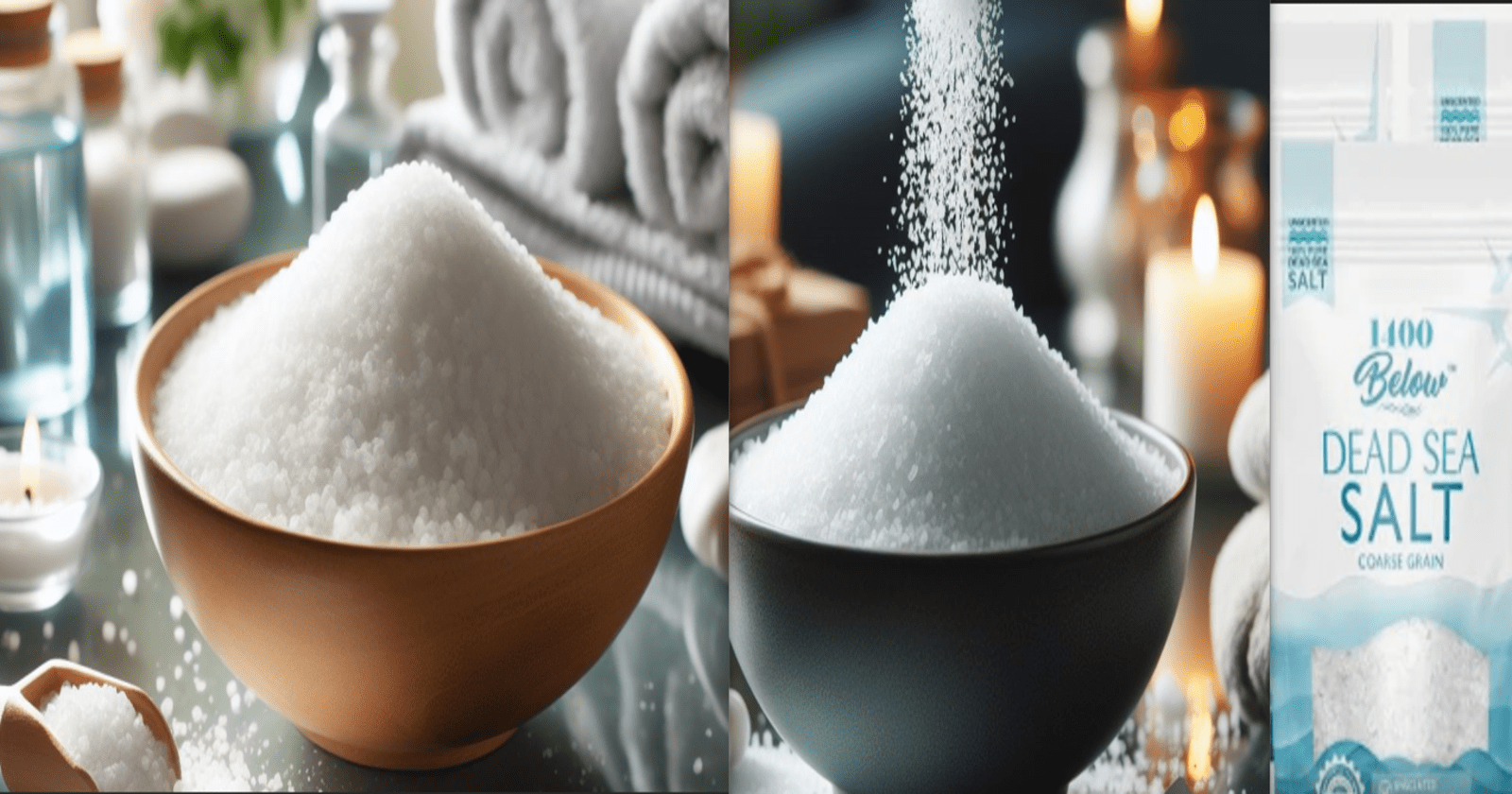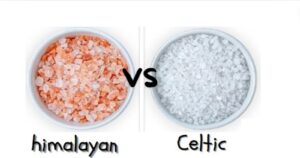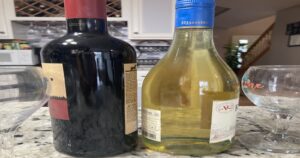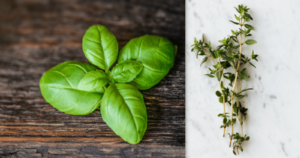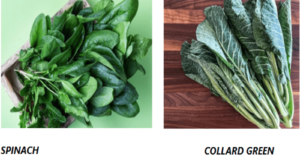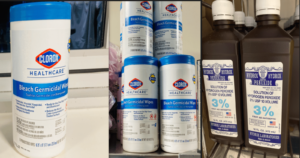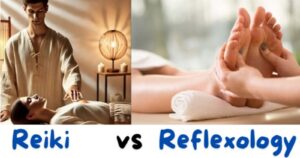Epsom salt, also known as magnesium sulfate, is a chemical compound consisting of magnesium, sulfur, and oxygen. It gets its name from the town of Epsom in Surrey, England, where it was originally discovered. It is not like regular table salt, we normally call it salt because of its chemicals composition.
Dead Sea salt is a type of salt that is harvested from the Dead Sea, a saltwater lake bordered by Jordan to the east and Israel and Palestine to the west. Unlike regular sea salt, Dead Sea salt contains a higher concentration of minerals, including magnesium, potassium, calcium chloride, and bromides, due to the unique composition of the Dead Sea water.

| Epsom Salt (Magnesium Sulfate) | Dead Sea Salt |
|---|---|
| MgSO4·7H2O | Primarily NaCl (with traces of Mg, K, Ca, and bromide) |
| Magnesium (Mg), Sulfur (S), Oxygen (O), Water (H2O) | Sodium Chloride (NaCl), Magnesium (Mg), Potassium (K), Calcium (Ca), Bromide, Trace minerals |
| Muscle relaxation, stress relief, | Skin health, detoxification, mineral replenishment |
| Rich source of magnesium, promotes muscle relaxation, stress reduction | High mineral content, skin-soothing, detoxifying properties |
Health and wellness benefits of Epsom salt (magnesium sulfate) vs Dead Sea salt
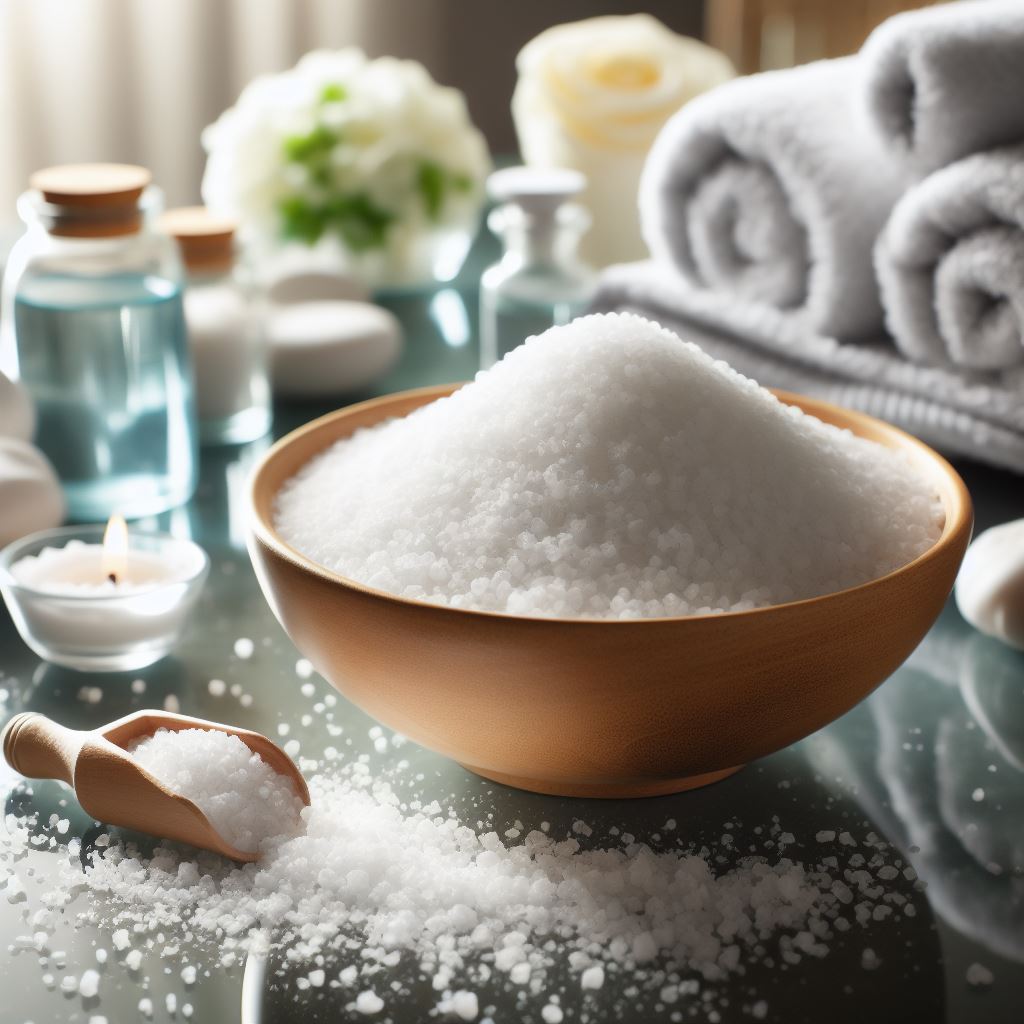
Epsom Salt (Magnesium Sulfate):
- Chemical Composition: Epsom salt is composed of magnesium, sulfur, and oxygen atoms. Its chemical formula is MgSO4·7H2O, indicating one magnesium (Mg) atom, one sulfur (S) atom, four oxygen (O) atoms, and seven water (H2O) molecules.
| Benefit | Description |
|---|---|
| Magnesium Source | Epsom salt is a rich source of magnesium, a mineral crucial for various bodily functions, including muscle and nerve function, enzyme activation, energy production, and electrolyte balance regulation. |
| Muscle Relaxation | Help relax muscles, alleviate soreness, and reduce inflammation. |
| Stress Relief | Promoting the production of serotonin, a neurotransmitter that contributes to feelings of well-being and relaxation. |
Muscle Relaxation: Epsom salt, also known as magnesium sulfate, is renowned for its muscle-relaxing properties. When dissolved in warm water, it releases magnesium ions, which can be absorbed through the skin. Magnesium plays a crucial role in muscle function, helping to relax muscles and alleviate soreness and tension.
Stress Relief: Soaking in an Epsom salt bath can also help reduce stress and promote relaxation. The magnesium in Epsom salt may help regulate neurotransmitters in the brain, such as serotonin, which can have a calming effect on the nervous system.
Dead Sea Salt:
- Chemical Composition: Dead Sea salt is primarily composed of sodium chloride (NaCl), with smaller amounts of other minerals such as magnesium, potassium, calcium, and bromide. However, its unique mineral composition sets it apart from regular sea salt. It also contains trace amounts of various other minerals, including zinc, iodine, and sulfur compounds.
| Benefits | Description |
|---|---|
| Mineral Richness | The Dead Sea is one of the saltiest bodies of water globally and contains a high concentration of minerals, including magnesium, potassium, and calcium. These minerals are believed to offer various therapeutic benefits for skin and overall health. |
| Skin Health | Dead Sea salt is renowned for its potential to improve skin conditions such as psoriasis, eczema, and acne. The minerals in Dead Sea salt are thought to possess anti-inflammatory, antimicrobial, and hydrating properties, which can soothe irritated skin, reduce redness, and promote healing. |
| Detoxification | The minerals in Dead Sea salt are believed to aid in detoxifying the body by promoting circulation, exfoliating dead skin cells, and drawing out impurities from the skin. This detoxifying effect may contribute to overall health and well-being. |
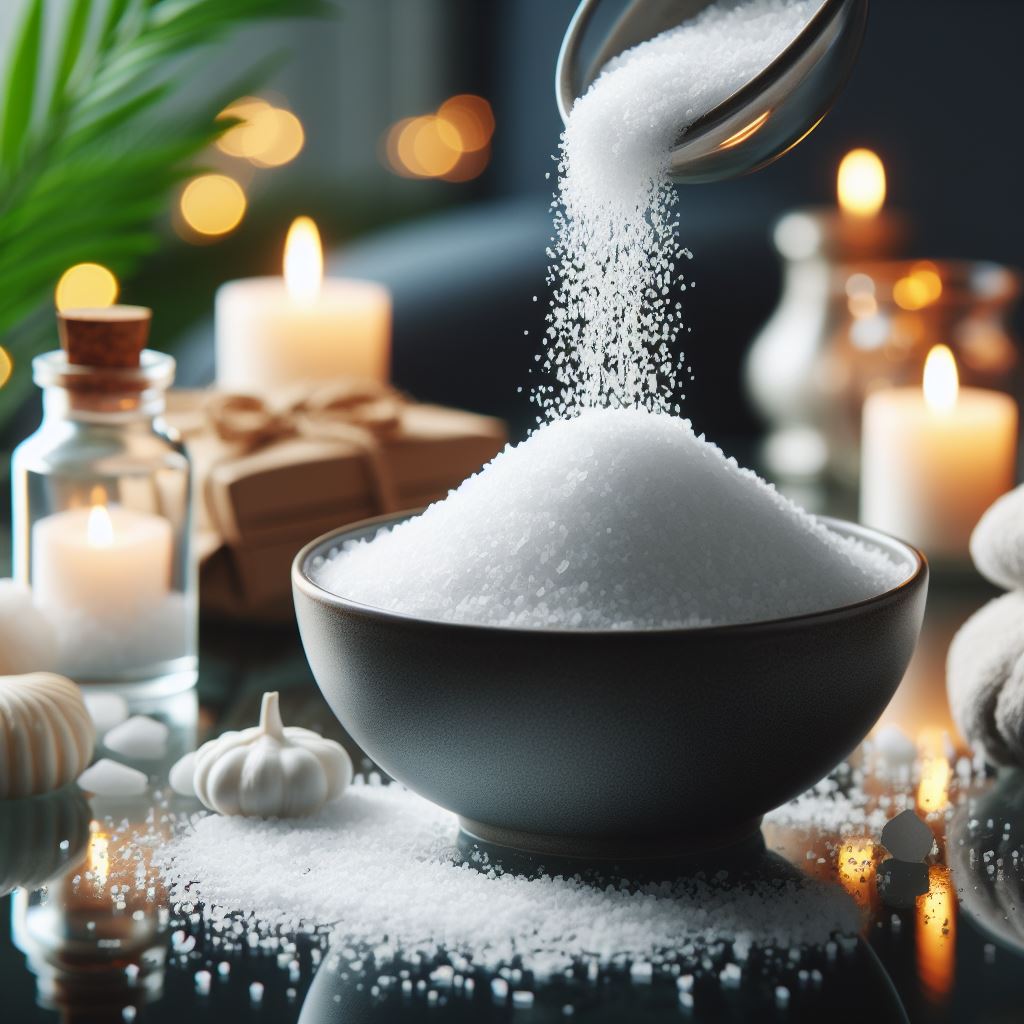
Skin Nourishment: Dead Sea salt is rich in minerals such as magnesium, calcium, potassium, and bromide, which can nourish the skin. These minerals help to hydrate and moisturize the skin, promoting a healthy complexion and combating dryness.
Detoxification: Dead Sea salt has natural detoxifying properties, drawing out impurities and toxins from the skin. This can help cleanse pores, reduce inflammation, and improve overall skin tone and texture.
Psoriasis Relief: Dead Sea salt baths have been found to be beneficial for individuals with psoriasis. The minerals in Dead Sea salt can help soothe irritated skin, reduce redness, and alleviate itching associated with this chronic skin condition.
While both Epsom salt and Dead Sea salt offer potential health benefits, their distinct chemical compositions result in different therapeutic properties. Epsom salt is valued for its high magnesium content and muscle-relaxing properties, while Dead Sea salt is prized for its rich mineral content and potential benefits for skin health and detoxification.
Nutritional Content of Epsom Salt vs Dead sea salt
Epsom Salt
Epsom salt, chemically known as magnesium sulfate, doesn’t contain typical nutrients like those found in food. However, it does provide magnesium and sulfate ions which can be beneficial for certain uses. Here’s a table outlining the main components of Epsom salt:
| Nutrient | Amount per 100g |
|---|---|
| Magnesium | ~10.8 grams |
| Sulfate | ~13.4 grams |
These values can vary slightly depending on the source and purity of the Epsom salt. Keep in mind that Epsom salt is primarily used for external purposes such as baths and foot soaks, and it’s not intended for consumption without medical supervision.
Dead sea Salt
Dead Sea salt is primarily composed of various minerals, but it doesn’t contain typical nutrients found in food. Here’s a general overview of the mineral composition of Dead Sea salt:
| Mineral | Approximate Content (%) |
|---|---|
| Magnesium | 31.0% |
| Sodium | 28.0% |
| Calcium | 0.4% |
| Potassium | 0.2% |
| Bromide | 0.5% |
| Chloride | 53.0% |
| Sulphate | 0.15% |
| Water of Crystallization | ~37.0% |
These values can vary slightly depending on the specific source of the Dead Sea salt.
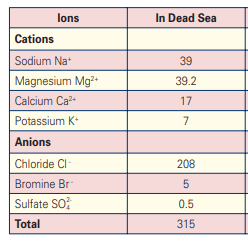
Can you eat Epsom Salt and Dead Sea Salt?
Epsom salt can be taken by mouth and is safe for most adults and children. It is usually ingested as a laxative or a form of magnesium supplement.
Growing up my mother would give us Epsom salt to drink when constipated and I can tell you it works well as a laxative.
Dead Sea Salt is not for any sort of consumption in food or drink. It is very bitter in taste and you can not use it for cooking due to it high sodium content.
Dead sea salt is high in bromide a very toxic chemical that can dissolve in water.
10 Uses of Epsom salt & Dead sea Salt
- Relaxation Bath: Adding Epsom salt to a warm bath can help relax muscles and alleviate stress. The magnesium in Epsom salt is absorbed through the skin, promoting relaxation.
- Muscle Pain Relief: Epsom salt baths are commonly used to soothe sore muscles and reduce muscle tension. It can be particularly helpful after intense physical activity or workouts.
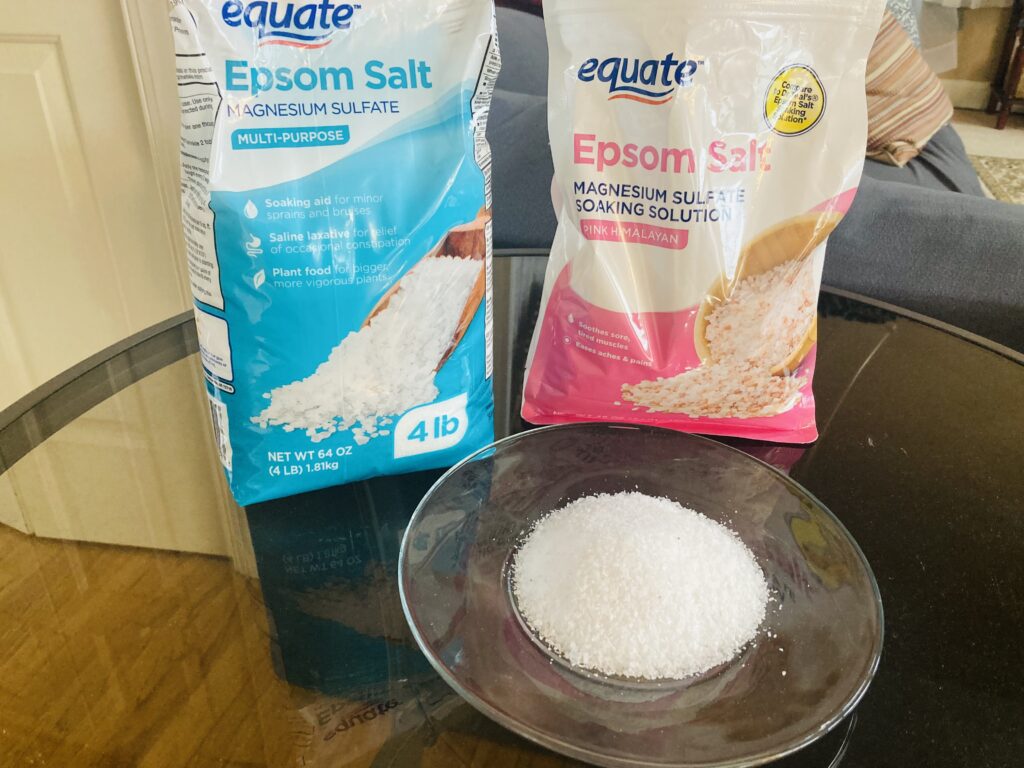
3. Foot Soak: Soaking feet in a warm Epsom salt bath can help relieve foot pain, reduce swelling, and soften rough skin.
4. Exfoliation: Epsom salt can be mixed with oils or water to create a natural exfoliating scrub. It helps remove dead skin cells, leaving the skin soft and smooth.
5. Gardening: Epsom salt is sometimes used as a fertilizer in gardening to improve plant growth. It provides magnesium and sulfur, which are essential nutrients for plant development.
6. Laxative: When taken orally under medical supervision, Epsom salt can act as a laxative to relieve constipation. It works by drawing water into the intestines, softening the stool and promoting bowel movements.
7. Insect Bite Relief: A paste made from Epsom salt and water can be applied to insect bites to reduce itching, swelling, and inflammation.
8. Sunburn Relief: Epsom salt can help soothe sunburned skin. Dissolving Epsom salt in water and spraying or applying it to the affected area can provide relief from pain and inflammation.
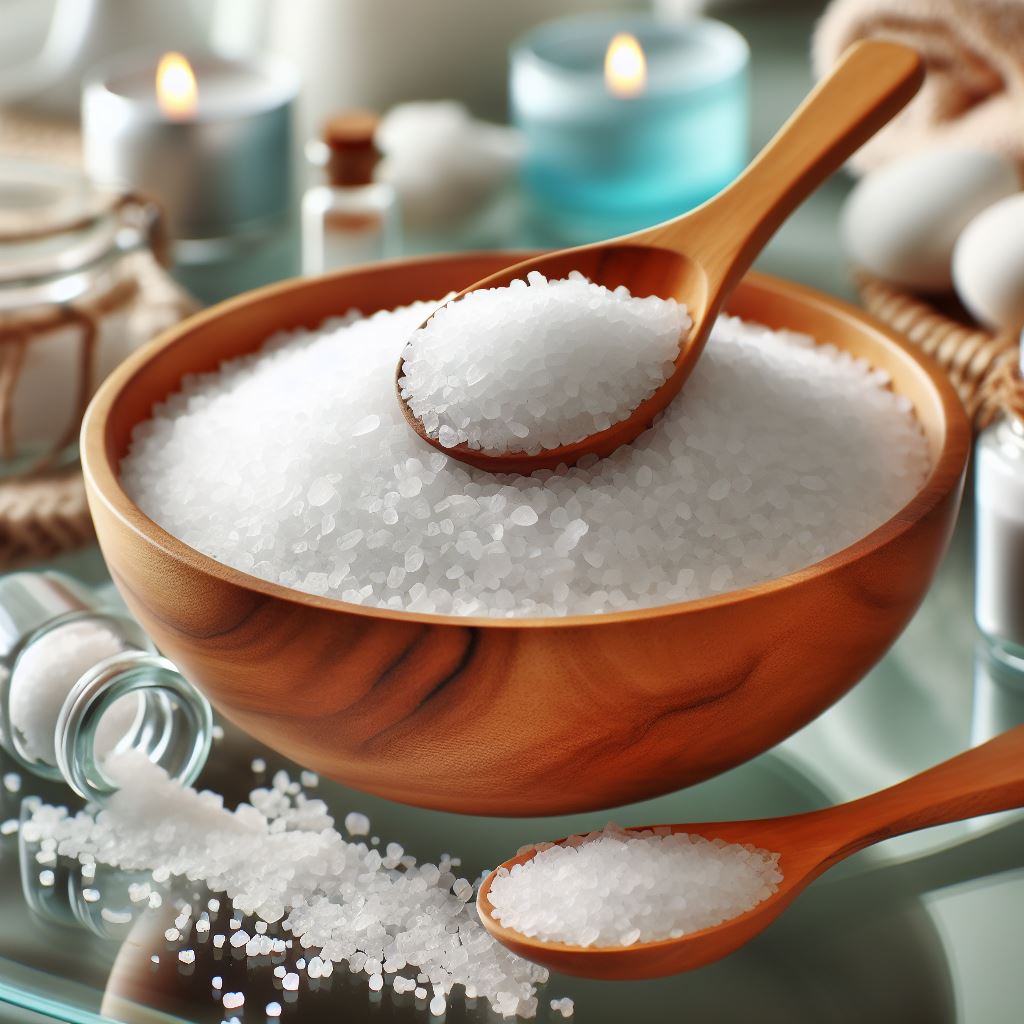
9. Hair Care: Epsom salt can be added to conditioner to help remove product buildup from the hair and scalp. It can also add volume and texture to hair when used as a styling product.
10. Skin Care: Epsom salt can be mixed with water to create a facial cleanser or mask. It helps cleanse pores, exfoliate dead skin cells, and reduce acne and blackheads. However, it’s essential to be cautious with its use on the face as it can be drying for some skin types.
10 Uses of Dead Sea Salt
1. Skin Exfoliation: Dead Sea salt can be mixed with oils or water to create an exfoliating scrub. It helps remove dead skin cells, leaving the skin soft and smooth. The minerals in the salt also nourish and rejuvenate the skin.

2. Psoriasis and Eczema Relief: The minerals in Dead Sea salt are known to soothe and relieve symptoms of skin conditions such as psoriasis and eczema. Soaking in a bath with Dead Sea salt can help reduce inflammation, itching, and redness associated with these conditions.
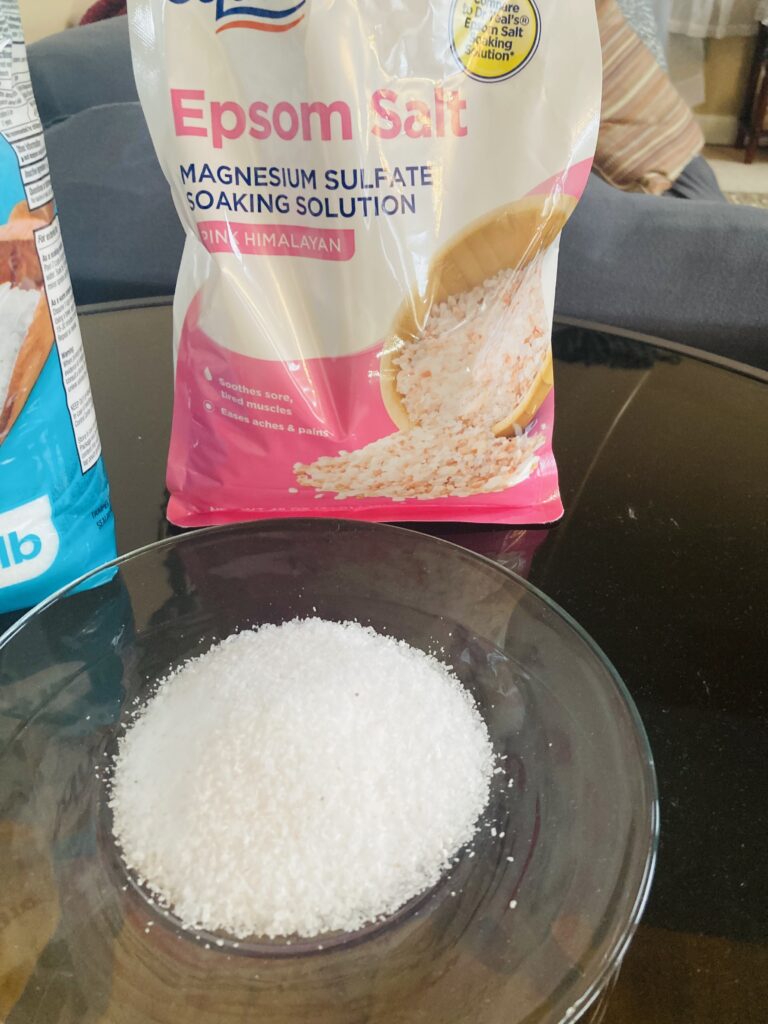
3. Muscle Relaxation: Similar to Epsom salt, soaking in a bath with Dead Sea salt can help relax muscles and relieve tension. The magnesium and other minerals in the salt are absorbed through the skin, promoting relaxation and easing muscle soreness.
4. Improving Circulation: Dead Sea salt baths can help improve blood circulation, which can have various health benefits, including promoting healing and reducing the risk of cardiovascular issues.
5. Detoxification: Dead Sea salt baths are believed to help detoxify the body by drawing out toxins through the skin. This can help improve overall health and well-being.
6. Acne Treatment: Dead Sea salt can be used as a natural treatment for acne. Its antibacterial properties can help cleanse pores, reduce inflammation, and prevent breakouts.

7. Hair Care: Dead Sea salt can be added to shampoo or used as a scalp scrub to remove product buildup, excess oil, and dead skin cells from the scalp. It can also help promote hair growth and improve scalp health.
8. Relief from Arthritis and Joint Pain: Soaking in a bath with Dead Sea salt may provide relief from arthritis and joint pain. The minerals in the salt can help reduce inflammation and improve mobility in affected joints.
9. Stress Relief: Dead Sea salt baths are known for their relaxing and stress-relieving properties. The minerals in the salt can help calm the mind and promote a sense of well-being.
10. Foot Soak: Soaking feet in a bath with Dead Sea salt can help relieve foot pain, reduce swelling, and soften rough skin.
Advantages of Epsom Salt vs Dead Sea salt
Epsom salt and Dead Sea salt both have their own set of advantages, depending on what you’re looking to achieve:
Advantages of Epsom Salt:
- Muscle Relaxation: Epsom salt, also known as magnesium sulfate, is renowned for its muscle relaxation properties. Soaking in an Epsom salt bath can help ease muscle tension and reduce soreness after workouts or physical exertion.
- Stress Relief: The magnesium in Epsom salt is believed to promote relaxation and reduce stress. Taking a warm bath with Epsom salt can help soothe the mind and body, promoting a sense of calmness.
- Improved Sleep: Many people find that soaking in an Epsom salt bath before bedtime can help promote better sleep due to its relaxation effects.
- Reduced Inflammation: Epsom salt baths may help reduce inflammation in the body, making them beneficial for conditions such as arthritis or sore joints.
Advantages of Dead Sea Salt:
- Skin Health: Dead Sea salt is rich in minerals like magnesium, calcium, and potassium, which are beneficial for skin health. It can help improve skin hydration, reduce inflammation, and promote healing.
- Exfoliation: Dead Sea salt can act as a natural exfoliant, helping to remove dead skin cells and promote smoother, softer skin.
- Detoxification: The minerals in Dead Sea salt are believed to help draw out toxins from the skin, making it beneficial for detoxifying baths or skincare treatments.
- Psoriasis Relief: Dead Sea salt baths have been found to be particularly beneficial for people with psoriasis, helping to reduce symptoms such as itching and redness.
Epsom salt is often preferred for its muscle relaxation and stress-relief properties, while Dead Sea salt is prized for its skin benefits and detoxification properties. Depending on your specific needs, you may choose one over the other, or even combine them for a more holistic approach to wellness.
Medications that interacts with Epsom salt
- Oral Magnesium Supplements: Taking oral magnesium supplements along with Epsom salt baths may lead to excessive magnesium levels in the body, which can cause adverse effects such as diarrhea, nausea, and abdominal cramping.
- Lithium: Epsom salt baths may potentially increase lithium levels in the body, which can be dangerous. Lithium is commonly used to treat bipolar disorder, and high levels can lead to lithium toxicity.
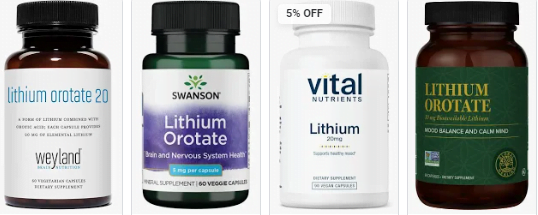
- Lithium Carbonate (brand names: Eskalith, Lithobid, Lithonate)
- Lithium Citrate (brand name: Cibalith-S)
- Lithium Aspartate
- Lithium Orotate
3. Certain Antibiotics (e.g., Aminoglycosides): Magnesium can interfere with the absorption of certain antibiotics, particularly aminoglycosides like gentamicin and tobramycin. It’s advisable to separate the timing of taking these medications and using Epsom salt baths.
The aminoglycosides include gentamicin, amikacin, tobramycin, neomycin, and streptomycin.
Medications that interact with Dead Sea Salt
1.Medications for high blood pressure: Dead Sea salt contains high levels of magnesium, which could potentially interact with medications used to lower blood pressure, such as ACE inhibitors, beta-blockers, calcium channel blockers, and diuretics.
2. Medications for heart conditions: Similar to high blood pressure medications, medications for heart conditions may interact with the magnesium content in Dead Sea salt.
3. Diuretics: Dead Sea salt may contain potassium and other electrolytes, which could interact with diuretics and affect electrolyte balance.
4. Medications affecting electrolyte levels: Any medication that affects electrolyte levels in the body, such as corticosteroids, may interact with Dead Sea salt due to its mineral content.
5. Lithium: If you’re taking lithium for mood disorders, the sodium content in Dead Sea salt may affect lithium levels in the body.
6. Topical medications: While Dead Sea salt is primarily used topically, if you have open wounds or broken skin, it’s possible that the minerals in Dead Sea salt could be absorbed into the bloodstream and interact with medications.
Differences in the Sourcing and Production of Epsom salt vs Dead Sea salt
| Epsom Salt | Dead Sea Salt |
|---|---|
| Naturally occurring mineral compound (Magnesium Sulfate) | Naturally occurring salt from the Dead Sea |
| Extracted from underground mineral deposits | Harvested through solar evaporation from the Dead Sea |
| Magnesium and sulfate ions | Sodium chloride, along with other minerals |
| Evaporation of mineral-rich water | Solar evaporation from the Dead Sea waters |
| Often undergoes purification processes to remove impurities | Minimal processing, may be crushed or ground |
| Purification processes such as filtration and crystallization | Typically minimal processing, may contain trace minerals |
| Requires energy for evaporation process | Uses solar energy for evaporation |
| Bathing, beauty products, medicinal purposes | Bathing, skincare, therapeutic purposes |
Scientific Research and Studies of Epsom salt and Dead Sea salt
Epsom Salt
- Muscle Relaxation: One of the most well-known uses of Epsom salt is for muscle relaxation and recovery. Some studies suggest that soaking in an Epsom salt bath may help alleviate muscle soreness and stiffness after exercise. The magnesium in Epsom salt is thought to be absorbed through the skin and aid in muscle relaxation.
- Pain Relief: While there is limited direct evidence, anecdotal reports and some small studies suggest that Epsom salt baths may provide relief for conditions such as arthritis, fibromyalgia, and general pain.
- Skin Health: Epsom salt is sometimes used in skincare products for its purported exfoliating and cleansing properties. However, scientific evidence supporting these claims is limited.
- Constipation: Oral magnesium sulfate, the active ingredient in Epsom salt, is sometimes used as a laxative. However, it’s important to use caution and consult a healthcare professional before using Epsom salt in this way, as excessive intake can lead to serious health complications.
Dead Sea Salt
- Skin Conditions: Dead Sea salt has been traditionally used for the treatment of various skin conditions, such as psoriasis and eczema. Some studies have found that bathing in water enriched with Dead Sea salt may improve symptoms of these conditions, possibly due to the unique mineral composition of Dead Sea salt, which includes high levels of magnesium, calcium, potassium, and bromides.
- Atopic Dermatitis: A study published in the International Journal of Dermatology found that Dead Sea salt baths improved the symptoms of atopic dermatitis (eczema) in children, reducing itching and skin inflammation.
- Psoriasis: Research published in the Journal of the European Academy of Dermatology and Venereology showed that Dead Sea salt baths, in combination with phototherapy, led to significant improvements in psoriasis symptoms compared to phototherapy alone.
- Rheumatologic Conditions: Some limited evidence suggests that Dead Sea salt baths may provide relief for rheumatologic conditions such as rheumatoid arthritis and osteoarthritis, possibly due to the anti-inflammatory properties of the minerals in Dead Sea salt.
Environmental impacts of harvesting Dead sea Salt vs Epsom Salt
Dead Sea Salt Extraction:
1.Water Depletion: Dead Sea salt extraction involves the evaporation of water from the Dead Sea, leading to a reduction in water levels. This depletion can have severe ecological consequences, affecting the unique ecosystem of the Dead Sea and surrounding areas.
2. Habitat Disruption: Altering the water levels of the Dead Sea can disrupt habitats for various species, including microorganisms, algae, and even migratory birds that rely on the area for breeding and feeding.
3. Sinkholes: The extraction of salt from the Dead Sea can also contribute to the formation of sinkholes along its shores. These sinkholes pose risks to infrastructure and human safety and are exacerbated by the decrease in water levels.
4. Chemical Pollution: The extraction and processing of Dead Sea salt can introduce chemicals and pollutants into the environment, including by-products of industrial processes and mining activities.
5. Energy Consumption: The energy-intensive nature of salt extraction and processing operations contributes to greenhouse gas emissions and exacerbates climate change.
Epsom Salt Production:
- Resource Extraction: Epsom salt, also known as magnesium sulfate, is typically obtained through mining or extraction from natural mineral deposits. While these processes can have environmental impacts such as habitat disruption and landscape alteration, they may be less severe compared to the extraction of Dead Sea salt.
- Energy Consumption: Similar to Dead Sea salt production, energy is required for mining, processing, and transportation in Epsom salt production. However, the overall energy demand may be lower due to potentially less complex extraction and processing methods.
- Chemical Pollution: Epsom salt production may involve chemical processes for purification and refinement. While these processes can generate waste and pollutants, they may be more contained compared to the industrial-scale extraction of minerals from the Dead Sea.
- Water Usage: Depending on the extraction method, Epsom salt production may require water for processing and purification. However, the water usage may be lower compared to Dead Sea salt extraction, as it typically does not involve large-scale evaporation processes.
While both Dead Sea salt extraction and Epsom salt production have environmental impacts, the extraction of Dead Sea salt tends to have more significant and wide-ranging consequences, particularly concerning water depletion and habitat disruption. Epsom salt production may still pose environmental challenges, but they may be comparatively less severe, depending on factors such as extraction methods and regulatory practices.
Preferences and Trends of Epsom salt and Dead Sea salt in health, wellness
1.Natural and Organic Trend: Consumers are increasingly seeking natural and organic ingredients in their health and skincare products. Epsom salt and Dead Sea salt are perceived as natural and environmentally friendly options, which aligns with this trend.
2. Perceived Benefits: Both Epsom salt and Dead Sea salt are believed to have various health and skincare benefits. Epsom salt, also known as magnesium sulfate, is believed to alleviate muscle soreness, reduce stress, and promote relaxation. Dead Sea salt is rich in minerals such as magnesium, calcium, and potassium, which are thought to improve skin hydration, reduce inflammation, and treat various skin conditions like psoriasis and eczema.
3. Social Media Influence: Influencers and beauty bloggers often promote the use of Epsom salt and Dead Sea salt in DIY skincare routines and spa treatments. Their endorsements contribute to increased consumer awareness and adoption of these salts in their personal care regimens.
4. Product Innovation: Companies in the health and wellness industry are incorporating Epsom salt and Dead Sea salt into a wide range of products, including bath salts, scrubs, soaps, and creams. These products are marketed as luxurious and indulgent experiences that offer both relaxation and skincare benefits.
5. Customization and Personalization: Consumers are increasingly seeking personalized skincare solutions tailored to their specific needs. Epsom salt and Dead Sea salt products offer versatility and can be easily customized with other natural ingredients like essential oils, herbs, and botanical extracts to address individual preferences and concerns.
6. Sustainability and Ethical Sourcing: With growing awareness of environmental and social issues, consumers are more conscious of the sourcing and production processes behind their skincare products. Companies that prioritize sustainable and ethical sourcing of Epsom salt and Dead Sea salt may appeal to environmentally conscious consumers.
7. Wellness Lifestyle: The wellness movement emphasizes self-care practices and holistic approaches to health and beauty. Epsom salt baths and Dead Sea salt treatments fit into this broader trend by offering consumers an opportunity to unwind, detoxify, and pamper themselves at home.
8. Clinical Research and Endorsements: Scientific studies supporting the benefits of Epsom salt and Dead Sea salt for various health and skincare concerns can influence consumer perceptions and purchasing decisions. Endorsements from dermatologists and healthcare professionals further validate the efficacy of these salts in promoting overall well-being.
Cost of Epsom Salt vs Dead sea salt
- Epsom Salt:
- Availability: Epsom salt is widely available in most grocery stores, pharmacies, and online retailers. It’s a common household item and is easily found in many regions around the world.
- Cost: Epsom salt is relatively inexpensive. Due to its widespread availability and simple production process (magnesium sulfate is the main component), it tends to be quite affordable.
- Dead Sea Salt:
- Availability: Dead Sea salt is less readily available compared to Epsom salt. It’s usually found in specialty stores, health food stores, or online retailers that specialize in natural or skincare products. Since it’s sourced from the Dead Sea, its availability might be limited depending on your location.
- Cost: Dead Sea salt tends to be more expensive than Epsom salt. Its specialized sourcing and production methods, as well as its reputation for various skincare benefits, contribute to its higher price tag.
Here is a list retailors you can get these products
Epsom Salt:
- Walmart
- CVS Pharmacy
- Walgreens
- Target
- Amazon
- Whole Foods Market
- Home Depot
- Lowe’s
- Amazon
Dead Sea Salt:
- Specialty health food stores
- Natural beauty stores (such as Sephora or Ulta Beauty)
- Online retailers specializing in natural or skincare products (e.g., The Body Shop, Lush)
- Spa supply stores
- Dead Sea salt-specific brands and websites (e.g., AHAVA, Dead Sea Warehouse)
- Amazon
Resources
https://pubmed.ncbi.nlm.nih.gov/15689218/
https://www.weizmann.ac.il/sci-tea/Brombook/pdf/chapter2%20.pdf
